霍布斯、洛克和卢梭之比较
社会契约论:霍布斯、洛克与卢梭的观点比较

霍布斯的政治哲学对后世的影响
霍布斯的政治 哲学对现代国 家主权理论的
影响
01
• 为现代国家的权力分配和行 使提供了理论依据
霍布斯的政治 哲学对现代国 际关系的影响
02
• 为现代国际秩序的维护和国 际合作提供了理论支持
03
洛克的自然权利政治哲学
洛克的自然状态理论及其人性观
洛克的自然状态理论
• 认为人类在自然状态下是自由、平等和 拥有自然权利的 • 人们通过契约建立国家,国家的任务是 保护人民的自然权利
02
霍布斯的人性观
• 认为人类本性是自私、贪婪和好斗的, 需要通过法律和道德来约束
霍布斯的契约论观点及其国家主权
霍布斯的国家主权观
• 国家主权是神圣不可侵犯的,人民无权反抗 • 国家主权是国家稳定、社会秩序和公共利益的基础
霍布斯的契约论观点
• 人们通过契约将全部权力交给国家,国家拥有绝对主权 • 国家的任务是维护人民的安全、实现社会秩序和提供公共服务
洛克的政治哲学对后世的影响
洛克的政治哲 学对现代政治 制度的影响
01
• 为现代国家的权力分配和行 使提供了理论依据
洛克的政治哲 学对现代法治 观念的影响
02
• 为现代国家的法治建设提供 了理论支持
04
卢梭的民主共和政治哲学
卢梭的自然状态理论及其人性观
卢梭的自然状态理论
• 认为人类在自然状态下是自 由、平等和善良的 • 人们通过契约建立国家,国 家的任务是实现人民的共同意 志和公共利益
社会契约论的发展
• 从霍布斯的绝对主义到洛克的自然权利,再到卢梭的民主共和,观点逐渐演变 • 不同哲学家对社会契约论的理解和阐述各有侧重,形成了多样的政治哲学体系
社会契约论探源_霍布斯_洛克_卢梭社会契约论之比较分析_姚萍
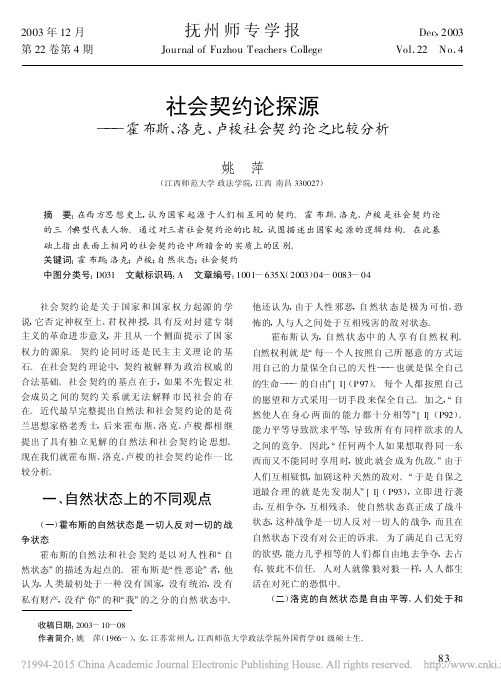
收稿日期:2003-10-08作者简介:姚 萍(1966-),女,江苏常州人,江西师范大学政法学院外国哲学01级硕士生。
2003年12月抚州师专学报Dec ,2003第22卷第4期Journal of Fuzhou Teachers CollegeVol .22 No .4社会契约论探源———霍布斯、洛克、卢梭社会契约论之比较分析姚 萍(江西师范大学政法学院,江西南昌330027)摘 要:在西方思想史上,认为国家起源于人们相互间的契约。
霍布斯、洛克、卢梭是社会契约论的三个典型代表人物。
通过对三者社会契约论的比较,试图描述出国家起源的逻辑结构。
在此基础上指出表面上相同的社会契约论中所暗含的实质上的区别。
关键词:霍布斯;洛克;卢梭;自然状态;社会契约中图分类号:D031 文献标识码:A 文章编号:1001-635X (2003)04-0083-04 社会契约论是关于国家和国家权力起源的学说,它否定神权至上、君权神授,具有反对封建专制主义的革命进步意义,并且从一个侧面提示了国家权力的源泉。
契约论同时还是民主主义理论的基石。
在社会契约理论中,契约被解释为政治权威的合法基础。
社会契约的基点在于,如果不先假定社会成员之间的契约关系就无法解释市民社会的存在。
近代最早完整提出自然法和社会契约论的是荷兰思想家格老秀士,后来霍布斯、洛克、卢梭都相继提出了具有独立见解的自然法和社会契约论思想。
现在我们就霍布斯、洛克、卢梭的社会契约论作一比较分析。
一、自然状态上的不同观点(一)霍布斯的自然状态是一切人反对一切的战争状态霍布斯的自然法和社会契约是以对人性和“自然状态”的描述为起点的。
霍布斯是“性恶论”者,他认为,人类最初处于一种没有国家,没有统治,没有私有财产,没有“你”的和“我”的之分的自然状态中。
他还认为,由于人性邪恶,自然状态是极为可怕、恐怖的,人与人之间处于互相残害的敌对状态。
霍布斯认为,自然状态中的人享有自然权利。
霍布斯、洛克、卢梭社会契约论思想比较
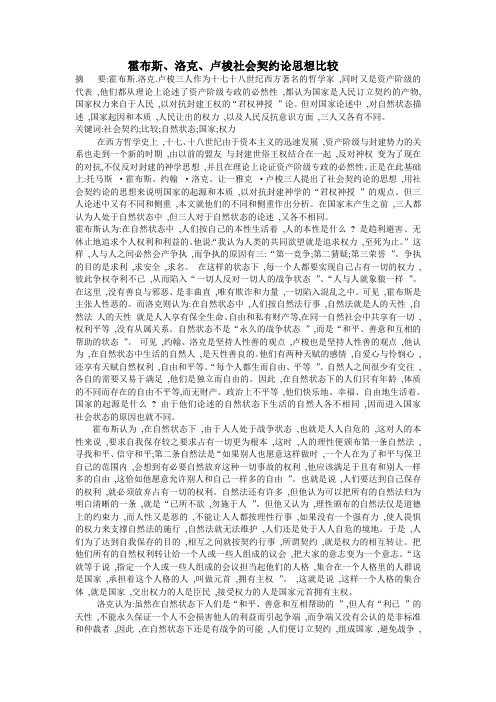
霍布斯、洛克、卢梭社会契约论思想比较摘要:霍布斯.洛克.卢梭三人作为十七十八世纪西方著名的哲学家,同时又是资产阶级的代表,他们都从理论上论述了资产阶级专政的必然性,都认为国家是人民订立契约的产物,国家权力来自于人民,以对抗封建王权的“君权神授”论。
但对国家论述中,对自然状态描述,国家起因和本质,人民让出的权力,以及人民反抗意识方面,三人又各有不同。
关键词:社会契约;比较;自然状态;国家;权力在西方哲学史上,十七、十八世纪由于资本主义的迅速发展,资产阶级与封建势力的关系也走到一个新的时期,由以前的盟友与封建世俗王权结合在一起,反对神权变为了现在的对抗,不仅反对封建的神学思想,并且在理论上论证资产阶级专政的必然性。
正是在此基础上:托马斯·霍布斯、约翰·洛克、让一雅克·卢梭三人提出了社会契约论的思想,用社会契约论的思想来说明国家的起源和本质,以对抗封建神学的“君权神授”的观点。
但三人论述中又有不同和侧重,本文就他们的不同和侧重作出分析。
在国家末产生之前,三人都认为人处于自然状态中,但三人对于自然状态的论述,又各不相同。
霍布斯认为:在自然状态中,人们按自己的本性生活着,人的本性是什么? 是趋利避害、无休止地追求个人权利和利益的。
他说:“我认为人类的共同欲望就是追求权力,至死为止。
”这样,人与人之间必然会产争执,而争执的原因有三:“第一竞争;第二猜疑;第三荣誉”。
争执的目的是求利,求安全,求名。
在这样的状态下,每一个人都要实现自己占有一切的权力,彼此争权夺利不已,从而陷入“一切人反对一切人的战争状态”、“人与人就象狼一样”。
在这里,没有善良与邪恶、是非曲直,唯有欺诈和力量,一切陷入混乱之中。
可见,霍布斯是主张人性恶的。
而洛克则认为:在自然状态中,人们按自然法行事,自然法就是人的天性,自然法人的天性就是人人享有保全生命、自由和私有财产等,在同一自然社会中共享有一切,权利平等,没有从属关系。
霍布斯、洛克和卢梭关于社会契约论的区别
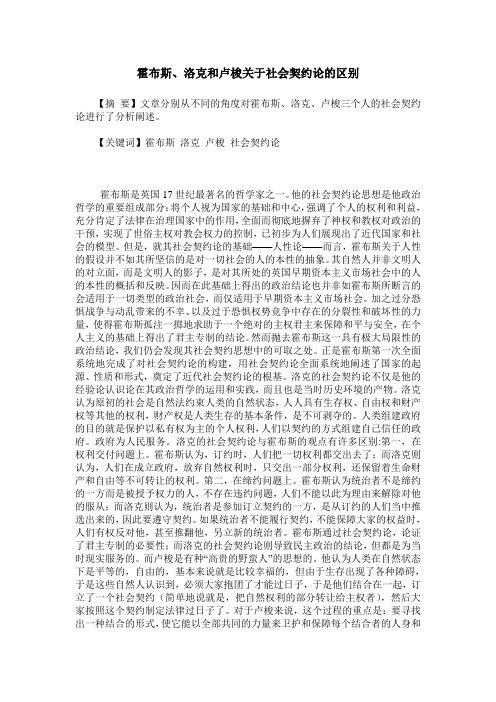
霍布斯、洛克和卢梭关于社会契约论的区别【摘要】文章分别从不同的角度对霍布斯、洛克、卢梭三个人的社会契约论进行了分析阐述。
【关键词】霍布斯洛克卢梭社会契约论霍布斯是英国17世纪最著名的哲学家之一。
他的社会契约论思想是他政治哲学的重要组成部分:将个人视为国家的基础和中心,强调了个人的权利和利益,充分肯定了法律在治理国家中的作用,全面而彻底地摒弃了神权和教权对政治的干预,实现了世俗主权对教会权力的控制,已初步为人们展现出了近代国家和社会的模型。
但是,就其社会契约论的基础——人性论——而言,霍布斯关于人性的假设并不如其所坚信的是对一切社会的人的本性的抽象。
其自然人并非文明人的对立面,而是文明人的影子,是对其所处的英国早期资本主义市场社会中的人的本性的概括和反映。
因而在此基础上得出的政治结论也并非如霍布斯所断言的会适用于一切类型的政治社会,而仅适用于早期资本主义市场社会。
加之过分恐惧战争与动乱带来的不幸、以及过于恐惧权势竞争中存在的分裂性和破坏性的力量,使得霍布斯孤注一掷地求助于一个绝对的主权君主来保障和平与安全,在个人主义的基础上得出了君主专制的结论。
然而抛去霍布斯这一具有极大局限性的政治结论,我们仍会发现其社会契约思想中的可取之处。
正是霍布斯第一次全面系统地完成了对社会契约论的构建,用社会契约论全面系统地阐述了国家的起源、性质和形式,奠定了近代社会契约论的根基。
洛克的社会契约论不仅是他的经验论认识论在其政治哲学的运用和实践,而且也是当时历史环境的产物。
洛克认为原初的社会是自然法约束人类的自然状态,人人具有生存权、自由权和财产权等其他的权利,财产权是人类生存的基本条件,是不可剥夺的。
人类组建政府的目的就是保护以私有权为主的个人权利,人们以契约的方式组建自己信任的政府。
政府为人民服务。
洛克的社会契约论与霍布斯的观点有许多区别:第一,在权利交付问题上。
霍布斯认为,订约时,人们把一切权利都交出去了;而洛克则认为,人们在成立政府,放弃自然权利时,只交出一部分权利,还保留着生命财产和自由等不可转让的权利。
霍布斯、洛克、卢梭的社会契约论的比较

霍布斯、洛克、卢梭的社会契约论的比较内容摘要:社会契约理论发端于古希腊的智者时代,到近代逐步发展成熟并形成体系。
作为西方政治哲学的一种理论假设,社会契约论对于宪政制度的设计和完善发挥着重要作用。
而作为近代西方社会契约论的代表人物,霍布斯主张订立社会契约的要义是维护秩序与安全,洛克主张构建社会契约的重心是保护人的自然权利,卢梭则坚决信奉人民主权原则。
本文将通过对三位学者有关社会契约论的思想进行简单比较,力求获得对近代西方社会契约理论的深入认识。
关键词:霍布斯、洛克、卢梭、社会契约论在政治思想上,人们最关心的问题莫过于“怎样才能协调人类争取自由的愿望与建立权威需要的关系”。
一方面,个体向往自由,渴望不受外在力量的羁绊。
另一方面,井然有序的生存方式和规范严整的社会秩序是极有必要的。
上述关键问题在近代西方思想家那里引出了许多答案。
作为代表人物,霍布斯、洛克以及卢梭运用不同的社会契约理论对之做出的解答则显得尤为深刻。
社会契约论作为一种政治哲学的理论假设,它主张国家并不是神权赋予,而是人们作出的理性选择。
人为了达到自由和至善,相互订立契约,交出自己的个人权利,承认国家的公共权力,以求得和平与幸福。
一、霍布斯的社会契约论近代启蒙主义思想家都将一种人类生活的自然状态作为社会契约论的理论预设,英国的霍布斯也不例外。
可以说,霍布斯开创了近代社会契约论发展黄金时代,他是对西方政治学说和实践具有划时代意义的社会契约论的创始人之一,他的社会契约论思想主要体现在其名著《论公民》、《利维坦》等中间。
霍布斯的出发点是“自然人”的观念。
如同自然界的动物和植物一样,人也因其自然本性而独立存在。
自然人是一种自然物体,完全服从自然法规则。
具体到人的本性上,就是“趋利避害”的自然本能。
霍布斯深受马基雅维里的影响,坚信人的本性是恶的,都是自私自利和残暴好斗的。
霍布斯认为,人类在进入社会之前,生活在自然状态,完全按照自然律行事。
他总结出两条自然律:一是利用一切手段保存自己,二是最大限度的维护自己的利益,在必要时放弃别人也同意放弃的权利。
不同社会契约论的不同预设——霍布斯、洛克和卢梭笔下自然状态的比较

不同社会契约论的不同预设——霍布斯、洛克和卢梭笔下自然状态的比较摘要:社会契约理论是西方政治哲学一个很重要的传统,经常被用来论证国家的合法性和个人自由的合法性。
霍布斯,洛克和卢梭都有社会契约理论,为了各自的社会契约理论的建立,他们都做了不同的前提预设,即自然状态。
通过三者不同的自然状态的比较,有助于我们更好地理解和把握社会契约理论。
关键词:自然状态;社会契约;比较一、社会契约论与自然状态的关系作为论证社会和国家成立的社会契约理论必然要面对的第一个问题是在达成契约之前人们的生活情景是怎样的,不同的思想家为了自己的理论目的预设了不同的背景。
自然状态与公民社会,自然权利和法律下的权利这样一些相互对应并且通过人类的自觉行为可以进化联系的概念一直是社会契约理论所要关注的焦点。
值得一提的是古典社会契约论者们虽然都认为在公民社会形成之前存在一个自然状态,但是几乎没有人坚定地认为作者笔下的这种自然状态和历史学家,考古学家认为的自然状态或原始状态是一回事。
无论是霍布斯,洛克或卢梭他们都有对自然状态的假设和描述,但是从来没有人认为这和史实是完全吻合的,至多是某个人的假设更靠近史实,另一个人的假设离史实远一点。
不同的自然状态假设只是为了不同的论证目的而服务,若深究其真实性在这里是没有意义的。
我们要给予重点考虑的应该是作者为什么要这么假设,他想在这个基础上说明什么,在这个假设基础与论证目的之间的内在逻辑是什么。
对于自然状态的假设依然和古往今来许多思想家面对一切假设问题时的逻辑出发点是一样的,首要考虑的是人性的善恶问题。
人性善,人性恶,抑或人性不分善恶,不同理念的秉持就会发展出不同的社会构想和制度设计。
熟识霍布斯,洛克和卢梭著作的人都会惊奇地发现,他们理论形式和内容的不同都源出于对人性的不同的假设。
二、霍布斯的自然状态作为近代第一个系统阐述社会契约论的人,霍布斯认为人的本性是恶的,都是自私自利的,没有法律约束,每个人都充分自由,随心所欲地追求自己的利益,这样,自由人的行为之间难免发生冲突。
卢梭 霍布斯 洛克契约论

卢梭、霍布斯与洛克的社会契约论探析
社会契约论是政治哲学的重要分支,由卢梭、霍布斯和洛克等学
者提出。
他们认为,人类社会的存在建立在人们自愿达成的契约基础上,具有普世意义。
本文将从三位学者的不同观点出发进行探析。
卢梭认为,社会契约源于人类本能的自爱和互爱情感。
由于自然
界的保障不足,人们选择组成社会,通过契约达成共同保护和福利目标。
他强调契约必须是自愿的、公正的,政府的权力应该来自人民的
授权,否则政府就是暴政。
卢梭的契约论中强调公正、自由和民主,
对留下了深厚的影响。
霍布斯则认为,社会契约是为了应对自然状态中的生存危机和战
争威胁。
人们为了安全和自卫,自愿将权利和自由让给统治者作为换
取保护的代价。
在他看来,社会契约的主要目的是为了确保“社会和平”,因此主张集中权力,支持绝对君主制。
霍布斯的契约论强调稳
定和秩序,对实现君主专制权力理念起到了重要影响。
洛克则坚信,社会契约是为了保护人的自然权利,人类在社会中
的自由和平等应该得到保障。
人民与政府之间通过契约达成了一种平
衡关系,政府必须被限制在一定的范围内,不能随意侵犯人民的权利。
洛克的契约论强调自由、平等和法治,对后来美国独立战争和宪法的
制定产生了重要的影响。
综合三位社会契约论的观点,我们可以得出一个基本结论:在任
何政权形式下,社会契约的核心都是保护人民的自然权利和自由,同
时确保社会的稳定和秩序。
在实际社会中,我们需要根据不同国情和社会需要,灵活运用社会契约理念,促进公正、自由、稳定、可持续的社会发展。
比较政治视野下的社会契约理论——以霍布斯、洛克、卢梭为例

比较政治视野下的社会契约理论——以霍布斯、洛克、卢梭为例摘要:社会契约理论是近代西方政治思想家提出的一套比较系统的关于国家起源以及政治制度设计的理论体系。
英国的霍布斯、洛克以及法国的卢梭均是近代西方以社会契约论为出发点来阐述国家起源和本质的。
然而通过比较发现,由于他们所处的历史环境和立场不同,他们关于契约的逻辑前提、定义、性质、约束力等方面的看法不同。
从比较政治学的角度去解析他们之间的差异,可以比较深刻地理解社会契约理论之一理论体系。
关键词:自然状态;社会契约;霍布斯一、契约产生的逻辑前提——自然状态霍布斯、洛克、卢梭都是从自然状态的假设出发,认为人是从一种自然状态发展到国家的。
在没有国家之前,人们一直是一种自然状态。
1.霍布斯“一切人反对一切人战争”的自然状态霍布斯从人性恶的角度出发,他认为自然状态是“一切人反对一切人的战争状态”。
在自然状态中,所有的人生来就是平等的,对于一切事物都拥有同等的权利。
但由于人的本性是自私的,每个人都想保持自身的自由,想拥有支配他人事物的权利,或者想占有一切。
正是因为每个人想达到自己的目的,所以人们之间发生无情的战争,于是,人们的生活是“孤独、贫困、卑污,残忍而短寿”。
霍布斯把引起人们相互争斗的原因归结为三种:一是竞争,起因于求利;二是猜疑,起因于求安全;三是荣誉,起因于求名誉。
争斗使人们处在战争状态下,而且这是一种“每个人对每个人的战争”。
2.洛克“完备无缺”的自然状态从人性善出发,洛克所阐述的自然状态是安静、祥和的状态,“那是一种完备无缺的自由状态,他们在自然法的范围内,按照他们认为合适的办法,决定他们的行动和处理他们的财产和人身,而不需要得到任何人的许可或听命于任何人的意志”。
人人平等而自由,不会存在任何人强迫他人的情况,这就是一种自然状态。
洛克认为霍布斯所描述的战争状态将自然状态和战争状态混为了一谈,他强烈批判霍布斯的这种描述。
洛克认为,人们在自然状态中平等地享受各种权利,并且不受外来意志的支配,但是这并不意味着在自然状态中人们就可以为所欲为而不受任何约束,相反,人们仍然要受到自然法也就是理性的支配和约束。
三种古典社会契约理论之比较——以霍布斯、洛克、卢梭为例

三种古典社会契约理论之比较——以霍布斯、洛克、卢梭为例陈刚;文玉【摘要】社会契约理论是一套关于国家起源以及政治制度设计的较为完整的理论体系.古典社会契约理论的代表人物霍布斯、洛克、卢梭都勾画了自己的社会契约理论.作为当时具有进步意义的政治思想,社会契约理论为资产阶级反对君权神授、推翻封建专制的统治提供了强大的思想武器.但是,由于这几种社会契约理论在伦理基础和时代背景等方面的不同,因此,三者的理论又表现出一定的差异.【期刊名称】《中共山西省委党校学报》【年(卷),期】2010(033)005【总页数】3页(P99-101)【关键词】社会契约;霍布斯;洛克;卢梭【作者】陈刚;文玉【作者单位】南昌大学,江西,南昌,330031;南昌大学,江西,南昌,330031【正文语种】中文【中图分类】D5霍布斯、洛克、卢梭都认为,人们在没有建立国家前,处于一种自然状态,但三者笔下的自然状态却不尽相同。
(一)霍布斯“人自为战”的自然状态。
基于人性恶的假设,霍布斯笔下的自然状态是“一切人反对一切人的战争状态”,这种战争是人类自然激情的必然结果。
霍布斯基于这样的两个假设:一是自然资源的稀缺性;二是在自然状态下人的能力在各个方面是大致相等的。
这两种假设使人们不可能在没有竞争的情况下满足其欲望,同时对于已经获取的资格,都必须“居安思危”,时刻警惕来自别人的威胁。
而人们要想维护自己的所有物,必须拥有权势,这种权势使别人对他产生敬畏。
于是有三种原因造成了自然状态下人们之间的争斗:一是竞争,二是猜疑,三是荣誉。
“第一种原因使人为了求利,第二种原因使人为了求安全,第三种则使人为了求名誉而进行侵犯”。
〔1〕(P198)(二)洛克“田园牧歌”式的自然状态。
洛克所描述的自然状态是一种安静祥和的局面,“那是一种完备无缺的自由状态,他们在自然法的范围内,按照他们认为合适的办法,决定他们的行动和处理他们的财产和人身,而不需要得到任何人的许可或听命于任何人的意志”。
论述霍布斯、洛克和卢梭社会契约理论的异同之处
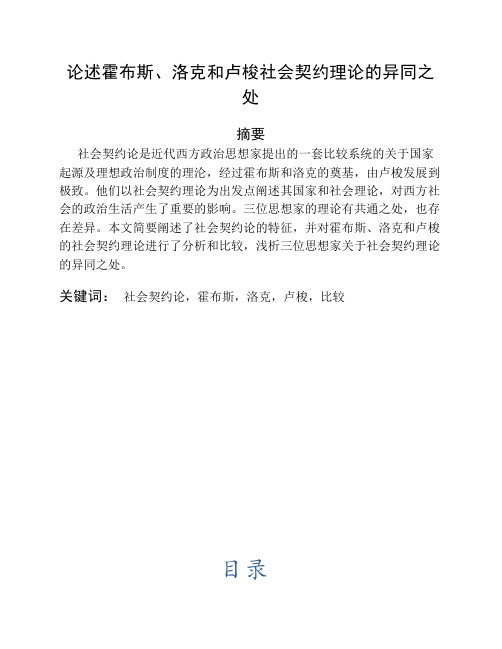
论述霍布斯、洛克和卢梭社会契约理论的异同之处摘要社会契约论是近代西方政治思想家提出的一套比较系统的关于国家起源及理想政治制度的理沦,经过霍布斯和洛克的奠基,由卢梭发展到极致。
他们以社会契约理论为出发点阐述其国家和社会理论,对西方社会的政治生活产生了重要的影响。
三位思想家的理论有共通之处,也存在差异。
本文简要阐述了社会契约论的特征,并对霍布斯、洛克和卢梭的社会契约理论进行了分析和比较,浅析三位思想家关于社会契约理论的异同之处。
关键词:社会契约论,霍布斯,洛克,卢梭,比较目录引言 3一、关于“社会契约论”思想 3(一)“社会契约论”思想的简述 3(二)对“社会契约论”的理解 3二、霍布斯、洛克和卢梭社会契约理论的相同之处 4三、霍布斯、洛克和卢梭社会契约理论的不同之处 4(一)对于 “自然状态”下人性善恶的观点不同 4(二)对于国家与政府的构想不同 5(三)对于国家权力的来源的不同观点(社会契约订立的方式) 6(四)契约缔结目的不同 6(五)对人民夺回主权方式的观点不同 7结语 8参考文献 9引言霍布斯、洛克与卢梭三位思想家,都从社会契约理论上论述了资产阶级专政的必然性,都认为国家是人民订立契约的产物,国家权力来自于人民。
但对于社会契约论的思想,又对自然状态描述、对国家与政府的构想、国家权力的来源、契约缔结目的以及人民的反抗等方面存在分歧。
一、关于“社会契约论”思想(一)“社会契约论”思想的简述社会契约论是近代西方政治思想家提出的一套比较系统的关于国家起源及理想政治制度的理沦,经过霍布斯和洛克的奠基,由卢梭发展到极致。
大体涵义是讲,一方面人们可以经过协议,订立契约,建立公平的社会,也即个人利益要让步于社会公共利益,全体公民自由自觉接受契约,才能达到自由意志与社会约束的统一;另一方面,人生而平等,自由平等是天赋不可剥夺的人权,统治阶级不能剥夺人民的自由,人民有权夺回自己的人权。
(二)对“社会契约论”的理解1.社会契约论将“自然状态”与“自然权利”作为理论前提,为人民主权思想寻找到理论根据,并证明了其自然性与神圣性。
霍布斯、洛克及卢梭社会契约论思想之比较

霍布斯、洛克与卢梭社会契约论思想之比较学号:1401231100专业:思想政治教育姓名:张敬源一、三者理论的相同之处(一)均建立在“自然状态”存在的基础之上一种理论的诞生,都离不开当时的国家、社会所处的状态,而一个合乎逻辑的理论的推想也都会有一个差生前提和缘由。
霍布斯、洛克与卢梭的社会契约论思想也不例外。
他们也对国家产生之前的人类社会状况进行了大胆的猜测和描述。
霍布斯和洛克认为在自然状态下人们所遵循的是一种所谓的“自然法”,而“自然法”的基础则是理性。
而人们之所以想要拜托自然状态则是因为自然状态下仍是有这样那样的缺陷。
人们的理性迫使人们从考虑自身利益的情况下去订立契约来更好的创造一种利于自身发展的社会秩序。
卢梭也同样设置了一个“自然状态”。
而随着时间的发展,社会经济的发展改变了这一自然状态,若要想继续和平生活下去,就必须通过某种方式来改变当前处境。
(二)认为国家、政府及法律均是社会契约的产物人类在自然状态存在种种缺陷和处在不利的形式下,主张把自己的权利转让组织一个共同体,由这个共同体处理国家事务,以确保人民的自身人身及其他权益。
首先,我们应该认识到,在签订社会契约时,三人均主张应该让渡自身的权利,不管是部分权利还是除生命健康权之外的全部权利,这都成为缔结契约的一个前提条件,这是三人理论观念的共识之一。
签订社会契约之后,国家便产生了,三人均认为国家是社会契约的产物。
同时,他们都认为人民权利的转让,是国家权力的唯一来源。
在此基础之上,政府和法律等一系列设施建立起来了,三人以此观点来对抗封建“君权神授”的理论。
二、三者理论的不同之处(一)关于自认状态的具体描述不同霍布斯把自然状态描述为一种战争状态,即“一切人反对一切人”的战争状态。
在国家产生之前,人类处在自然状态中,享有自然权利,特别是自由和平等的权利。
但同时霍布斯深受马基雅维里的影响,坚信人的本性是恶的,都是自私自利和残暴好斗的,人类都具有自我保存的本能和趋利避害的自私的天性。
霍布斯洛克卢梭自然状态学说异同点

霍布斯洛克卢梭自然状态学说异同点霍布斯洛克卢梭在政治哲学领域的自然状态学说是两种截然不同的理论。
霍布斯和洛克都试图解答人类社会以及政治组织的基础问题,如政府的正当性和社会契约的性质。
然而,他们的观点在很多方面存在着明显的异同点。
首先,两者对于自然状态的本质和状态的描述存在明显的区别。
霍布斯认为人类在自然状态下是一种“战争的状态”,即每个人都与其他人竞争,没有政府的控制和保护,因此其生活通常是孤立、恶劣、危险和不安全的。
洛克则对自然状态的描述较为乐观,他认为自然状态下的人类是自由和平等的,具有自己的道德及理性,并且每个人都拥有一定的自然权利。
其次,对于政府的正当性,霍布斯和洛克存在着不同的看法。
霍布斯认为政府的存在是为了保护人们免于自然状态下的战争和暴力,维护社会秩序和安全,从而实现和平与稳定。
政府在霍布斯的理论中具有绝对统治权力,人民必须通过社会契约来剥夺他们的自由权利,将自己的权力交给合法的统治者。
洛克则强调政府的正当性源于人民的自愿同意,他们共同协商和达成的社会契约是政府权力的合法基础。
除了对于政府正当性的看法之外,他们还在社会契约的性质上存在明显的不同。
霍布斯认为社会契约是一种人们自愿放弃个人权利的行为,是为了和平与安全而建立的政府,人民将自己的权力和权益完全交给统治者。
他认为一旦达成社会契约,人民就无权反抗政府的统治。
洛克则认为社会契约是一种合作关系,人民和政府之间存在着互相依赖的关系,政府的责任是保护人民的自然权利。
如果政府不能履行这一责任,人民有权反抗并改变政府。
此外,他们对人类天性及自然权利的看法也存在明显的异同。
霍布斯强调人类的自私和自利天性,他认为人类在自然状态下是无法和平相处的。
洛克则认为人类具有理性和道德的本能,拥有自然权利,即生命、自由和财产。
他认为政府的存在是为了保护人民的自然权利,而不是剥夺和限制这些权利。
尽管霍布斯洛克卢梭的自然状态学说存在着明显的异同点,但他们都试图解答政治组织的基础问题,探讨政府的正当性和社会契约的本质。
霍布斯、洛克与卢梭社会契约理论之比较
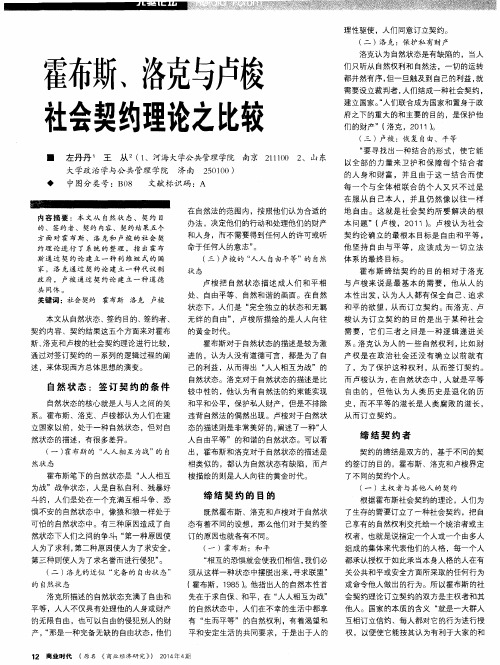
而 卢梭认 为 , 在 自然状 态 中, 人就是 平等
自由 的 ,但 他认 为人类 历史 是退 化 的历
自然 状 态 :签 订 契 约 的 条 件
自然状态 的核心就是人 与人之 间的关
较 中性 的 ,他认 为有 自然 法的约 束能 实现 和平和公平 ,保 护私人财产 ,但是 不排 除
然状 态
态 的描述则是非 常美好 的, 阐述了一种“ 人 人 自由平等 ”的和谐 的 自然状 态。可以看 出,霍布斯和洛克对于 自然状态 的描述是 相 类似 的 ,都认为 自然状态有缺陷 ,而卢
梭 描绘 的则是人人 向往 的黄金 时代 。
缔 结 契 约 者
契约的缔结是双方 的,基于不 同的契
地 自 由。这 就是 社会 契 约所 要解 决 的根 本 问题”( 卢梭 ,2 0 1 1) 。卢梭 认 为社会 契约论确 立 的最 根本 目标 是 自由和平等 , 他坚 持 自 由与平 等 ,应该 成 为一 切立 法 体系 的最终 目标。
霍布 斯缔 结 契约 的 目的相 对 于洛 克
们的财产”( 洛克 ,2 0 1 1】ቤተ መጻሕፍቲ ባይዱ。
( 三 )卢梭 :恢复 自由、平等
“ 要 寻 找 出 一 种 结 合 的 形 式 ,使 它 能
以全 部 的力 量来 卫护 和保 障每 个 结合 者 的人 身和 财 富 ,并且 由于 这 一结 合而 使 每 一 个与 全体 相 联合 的个 人 又只 不过 是
理性驱使 ,人们 同意订立契约。
( 二 )洛 克 :保 护 私 有 财 产
洛克认 为自然状 态是有缺 陷的 ,当人
霍 布 斯、 洛 克 与 卢 梭
霍布斯卢梭洛克的自然法

霍布斯卢梭洛克的自然法霍布斯、卢梭和洛克是三位著名的政治哲学家,他们对自然法的理论产生了深远影响。
霍布斯主张人类天生自私、野蛮,需要政府来维持社会秩序和权威;卢梭认为人类天生自由平等,政府应该由人民共同参与;洛克则认为人类天生享有自然权利,政府应该受人民授权。
首先,霍布斯对自然法的看法是非常悲观的。
他认为人类在自然状态下会陷入无尽的战争和混乱之中,因为每个人都会为了自己的利益而不择手段。
为了摆脱这种混乱,人们需要通过社会契约来创造一个有权威的政府,以保护人们的生命和财产。
霍布斯的自然法理论强调了人类的自私和自我保护的本能,认为政府的存在是为了避免人类陷入永无止境的混乱之中。
相比之下,卢梭对自然法的看法则更为乐观。
他认为人类天生自由平等,只有社会的不公正和私有财产的存在才会导致人类的不平等和冲突。
卢梭主张人类应该回归自然状态,通过社会契约建立一个彼此平等的政府,以实现人民的自由和公正。
卢梭的自然法理论强调了人类的自由和平等的重要性,认为政府的存在应该是为了保障人民的权利和利益。
最后,洛克的自然法理论则强调了人类的自然权利和政府的授权。
洛克认为人类在自然状态下享有生命、自由和财产的权利,政府的存在应该是为了保护这些权利。
政府的合法性来自人民的授权,只有得到人民的同意和支持,政府才有权利对人民施加约束和制约。
洛克的自然法理论强调了人类的权利和政府的合法性的重要性,认为政府的存在应该是为了保障人民的自由和权利。
总的来说,霍布斯、卢梭和洛克的自然法理论都是对人类政治生活的深刻思考和探索。
他们的理论不仅影响了当时的政治哲学,也对后世的政治实践产生了重要的影响。
通过对这三位哲学家的自然法理论的比较和分析,人们可以更好地理解人类政治生活的本质和发展的趋势,为建设一个自由、平等和公正的社会提供有益的启示。
霍布斯、洛克和卢梭社会契约思想之比较

霍布斯、洛克和卢梭社会契约思想之比较作者:曹津来源:《法制与社会》2019年第20期摘要关于政府起源的理论,近代西方政治思想家提出了一套比较系统的说法,我们称之为社会契约论,其最早可以溯源到古希腊时期的思想家伊壁鸠鲁,并且在欧洲启蒙运动时期有了进一步发展,其中以霍布斯、洛克和卢梭的社会契约理论最具代表意义。
霍布斯首先对社会契约的起源做了充分的描述,之后,洛克则在霍布斯理论的影响下做出进一步的阐述,卢梭在法国大革命时期将这一理论发展推向顶峰,三位思想家的社会契约论对近现代资本主义国家的政治制度的建立和完善产生了巨大影响。
尤其是法国大革命就是一场深受社会契约理论影响的政治运动。
我们通过对比不难发现,由于所处历史环境以及个人经历的差异,三位思想家关于契约订立的原因、订立方式以及订立结果方面有着各自不同的看法,社会契约思想不仅极大的影响和鼓舞了资产阶级和劳动人民为推翻封建政权所做的斗争,而且成为西方国家宪政制度设计的重要理论基础。
关键词社会契约理论霍布斯洛克卢梭作者简介:曹津,河北师范大学马克思主义学院伦理学专业,硕士研究生。
中图分类号:B5 ; ; ; ; ; ; ; ; ; ; ; ; ; ; ; ; ; ; ; ; ; ; ; ; ; ; ; ; ; ; ; ; ;文献标识码:A ; ; ; ; ; ; ; ; ; ; ; ;DOI:10.19387/ki.1009-0592.2019.07.229一、社会契约订立原因的比较(一)霍布斯的“战争”状态霍布斯作为近代第一个系统阐述社会契约论的人,他认为人都是自私自利,本性是趋利避害的,在没有规则没有秩序约束的自然状态下,人人都随心所欲地享受着这份自由。
当人们因欲求同一事物而发生利益冲突时,竞争便会产生,再加上没有公共权力来约束人们行为时,于是战争就变成为了常态,人们的生命安全根本无法得到保障,无时不刻都会受到死亡的威胁。
为了保全自我,有的先发制人,用暴力和武器来获得足够的权势。
霍布斯、洛克、卢梭社会契约理论的比较

2 0 年 第 5期 0 6
淮 南 师 范 学 院 学 报
J U N LO A N NT A H R O L G O R A FHU I A E C E SC L E E
N o.5,2006 G ene alN O.39,V o18 r .
近 代 西 方 以 社 会 契 约 理 论 为 出 发 点 阐 述 其 国
家 和 社 会 理 论 的 思 想 家 不 少 ,有 英 国 的 霍 布 斯 、 说 。 认 为 , 约 的 目的是 结 束 野 蛮 的 战 争 状 态 , 洛 他 契 创
克 以 及 法 国 的 卢 梭 等 等 。 布 斯 在 自 然 法 和 契 约 观 造 和 平 生 活 , 人 的 理 性 约 束 人 的 欲 望 , 国 家 的 霍 用 以
Hale Waihona Puke [ 键 词 ] 社 会 契 约 ; 论 ; 较 关 理 比 [ 图 分 类 号 ]B1 中 4 [ 献 标 识 码 ] 文 A [ 章 编 号 ]1 0 - 5 0 2 0 0 — 0 9 0 文 0 9 9 3 ( 0 6) 5 0 1 — 3 霍 布 斯 从 自然 法 原 理 出 发 , 出 了 他 的 国 家 学 提
休 止 , 以 自然 状 态 不 是 一 个 和 平 状 态 。 为 了 更 好 切 行 为 都 是 合 法 的 。 布 斯 在 确 定 国 家 处 于 如 此 神 所 霍
地 实 现 自然 法 规 定 的 自 然 权 利 , 人 们 才 联 合 起 来 , 圣 不 可 侵 犯 、 受 任 何 束 缚 的 基 础 上 , 一 步 规 定 不 进 订 立 契 约 , 立 国 家 。 霍 布 斯 还 论 述 了 人 类 争 斗 的 了 主 权 者 的 权 利 , 国 家 权 力 遍 及 各 个 领 域 , 立 成 使 如 原 因 : 是 竞 争 , 因 于 求 利 ; 是 猜 疑 , 因 于 求 法 、 政 、 交 、 免 官 吏 、 惩 乃 至 新 闻 、 查 、 一 起 二 起 行 外 任 奖 检 言 安 全 ; 是 荣 誉 , 因 于 求 名 誉 。 斗 使 人 们 处 在 战 论 控 制 等 等 。 使 个 人 的 财 产 , 家 也 有 权 干 涉 。 三 起 争 即 国 由
霍布斯、洛克、卢梭的政府逻辑比较
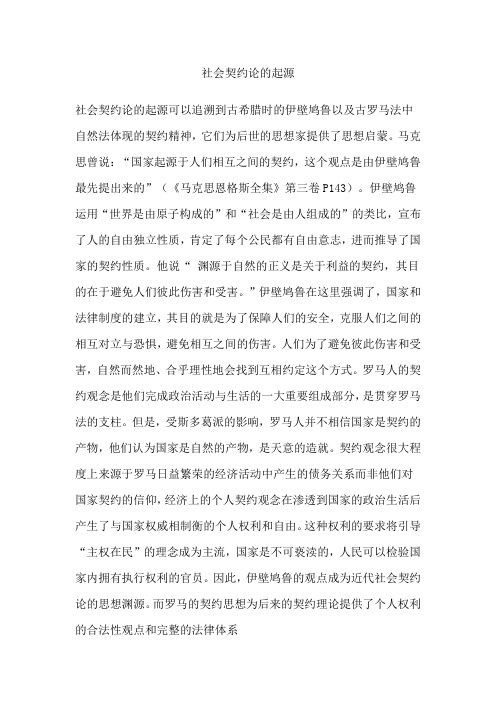
社会契约论的起源社会契约论的起源可以追溯到古希腊时的伊壁鸠鲁以及古罗马法中自然法体现的契约精神,它们为后世的思想家提供了思想启蒙。
马克思曾说:“国家起源于人们相互之间的契约,这个观点是由伊壁鸠鲁最先提出来的”(《马克思恩格斯全集》第三卷P143)。
伊壁鸠鲁运用“世界是由原子构成的”和“社会是由人组成的”的类比,宣布了人的自由独立性质,肯定了每个公民都有自由意志,进而推导了国家的契约性质。
他说“渊源于自然的正义是关于利益的契约,其目的在于避免人们彼此伤害和受害。
”伊壁鸠鲁在这里强调了,国家和法律制度的建立,其目的就是为了保障人们的安全,克服人们之间的相互对立与恐惧,避免相互之间的伤害。
人们为了避免彼此伤害和受害,自然而然地、合乎理性地会找到互相约定这个方式。
罗马人的契约观念是他们完成政治活动与生活的一大重要组成部分,是贯穿罗马法的支柱。
但是,受斯多葛派的影响,罗马人并不相信国家是契约的产物,他们认为国家是自然的产物,是天意的造就。
契约观念很大程度上来源于罗马日益繁荣的经济活动中产生的债务关系而非他们对国家契约的信仰,经济上的个人契约观念在渗透到国家的政治生活后产生了与国家权威相制衡的个人权利和自由。
这种权利的要求将引导“主权在民”的理念成为主流,国家是不可亵渎的,人民可以检验国家内拥有执行权利的官员。
因此,伊壁鸠鲁的观点成为近代社会契约论的思想渊源。
而罗马的契约思想为后来的契约理论提供了个人权利的合法性观点和完整的法律体系二、逻辑论证方法的界定霍布斯、洛克和卢梭的政府逻辑中都普遍应用了演绎法。
在演绎论证中,普遍性的观点是依据,而个别性观点是结论,演绎推理的过程就是从一般性的前提出发,通过推导得出具体或个别结论的过程。
比如说卢梭在《社会契约论》中有关主权的论述就能构成一个完整的演绎推理过程。
他认为“主权体并非他物,而只是公众意志的体现”,随后指出“私人的意愿在某些方面与公众的意志是一致的,但这种一致性却不是有规律的,不是长久的”,并且即使这种一致性能持续也是没有保障的,所以私人的意志不能完全代表主权。
霍布斯、洛克和卢梭之比较
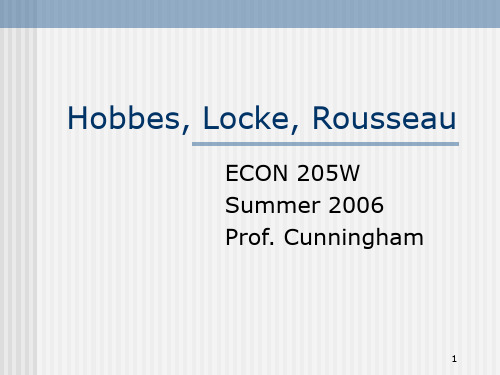
Social Contract
The social contract is not between the citizens and the ruling power. It is a contract citizens make with each other to accept the rule of central authority. The minority accepts the majority decision. A society so united forms a single body, a commonwealth, a leviathan.
Hobbes, Locke, Rousseau
ECON 205W Summer 2006 Prof. Cunningham
1
Thomas Hobbes (1588-1679)
Personal Background Most Important Writings:
The Elements of Law (1640) De Cive (The Citizen, 1642) Leviathan (1651)
6
Social Contract (2)
The ruler is the absolute authority. Parts of the social contract process. Validity of the contact. The contract is binding only if its purpose is fulfilled—i.e., that the citizens are secure.
- 1、下载文档前请自行甄别文档内容的完整性,平台不提供额外的编辑、内容补充、找答案等附加服务。
- 2、"仅部分预览"的文档,不可在线预览部分如存在完整性等问题,可反馈申请退款(可完整预览的文档不适用该条件!)。
- 3、如文档侵犯您的权益,请联系客服反馈,我们会尽快为您处理(人工客服工作时间:9:00-18:30)。
Distributive Justice
In the state of nature, people share a kind of equality. Inequality is a product of civil law. Regardless, people perceive themselves as equal, and will enter into contracts willingly only under equal terms. Doctrines of inequality don‟t work.
11
John Locke (1632-1704)
Background Basic ideas:
Rational agent model Coincidence of self-interest and general interest
Reacts more to Sir Robert Filmer than to Hobbes. Locke‟s message:
Felt that earlier thinkers (excluding Machiavelli and certain others) had failed because they attempted to base their theories of society on mankind‟s highest aspirations. Created a code of natural law as morally binding and determining the purpose of society. Separated his notion of natural law from human perfection. Develops a psychology of human passions or interests.
16
Self-Preservation
Everyone should pursue their own preservation, but is also obligated to pursue the preservation of the rest of humankind. What if these duties conflict? Aggression against others if a violation of the law of nature. A course of conduct that tends toward self-preservation is in accord with nature, which is the law of nature.
7
The Sovereign and Citizens
Rights of the sovereign:
Enforcement of Law Legislative power Judicial power
Sovereign is not subject to the laws. Citizens retain certain “inalienable rights” or “retained rights”
5
Social Contract
The social contract is not between the citizens and the ruling power. It is a contract citizens make with each other to accept the rule of central authority. The minority accepts the majority decision. A society so united forms a single body, a commonwealth, a leviathan.
6
Social Contract (2)
The ruler is the absolute authority. Parts of the social contract process. Validity of the contact. The contract is binding only if its purpose is fulfilled—i.e., that the citizens are secure.
All government is limited in its powers and exists only by the consent of the governed. All people are born free.
12
Great Works
Two Treatises on Government (1690) A Letter Concerning Toleration (1689) Some Considerations of the Consequences of the Lowering of Interest and Raising the Value of Money (1691)
Overall Objectives:
To put moral and political philosophy on a scientific basis Contribute to the stability, peace, and welfare of mankind
2
Approach
8
Entitlement Theory
Distributive justice. The guarantee of performance on contracts is the basis of all justice. Without respect for (private) property rights, everyone has a claim on everything, and chaos reigns. Justice is not equal outcomes, but rather equality of process and equality of opportunity.
15
The State of War
It is the use of force without right. In peace, there is no use of force without right. Allows that there are “inconveniences” in the state of nature in which people may need to be judges in their own case. It such situations, the state of nature may be indistinguishable from the state of war.
Hobbes, Locke, Rousseau
ECON 205W Summer 2006 Prof. Cunningham
1
Thomas Hobbes (1588-1679)
Personal Background Most Important Writings:
The Elements of Law (1640) De Cive (The Citizen, 1642) Leviathan (1651)
3
Approach (2)
Believed he had uncovered the basis of human behavior and human nature. Used these as assumptions to build his theory. Believes people have competing interests, and this has implications. The “State of Nature.”
14
Answers:
The State of Nature
Contrast with Hobbes‟ view. The state of nature is a state of perfect freedom and equality. The world was never without political or social structure. Political and social structure arise naturally with humankind. People “… living together according to reason, without a common superior on earth with authority to judge between them, is properly the state of nature.”
4
Implications
Байду номын сангаас
To prevent chaos, society, though political and economic organization use the force and coercion to hold society together. People ought to be willing to give up the same rights as they expect others to give up, and out to be satisfied with just as much liberty with respect to others as others have with respect to them. Agreement to this by the members of society forms the social contract.
